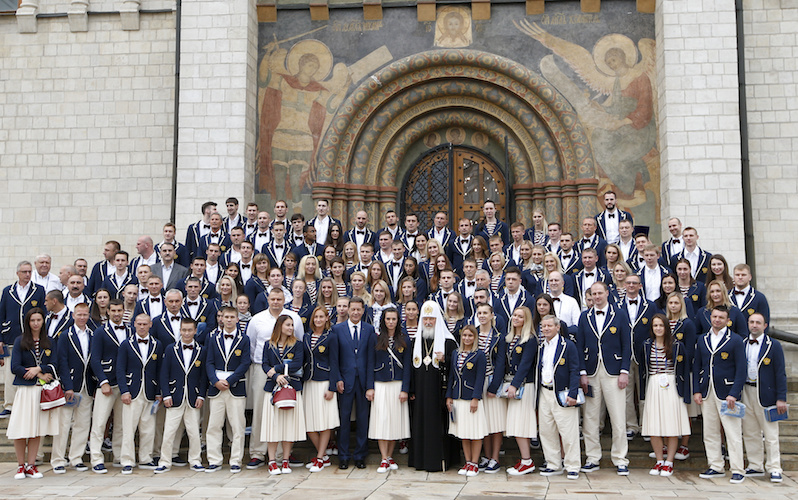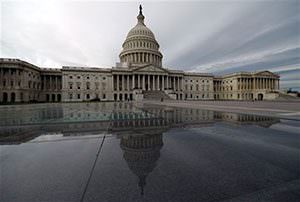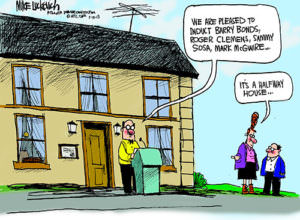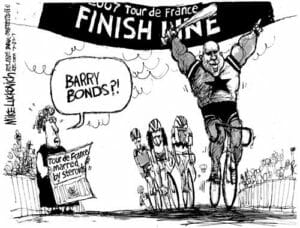Add Russia’s Olympic Doping Scandal to the Rich History of Cheating in Sports
Seeking an unfair advantage in sports did not originate in the former Soviet Union, but state-sanctioned cheating is much more common in communist or former communist countries. Alexander Zhukov, center left, president of Russia's Olympic Committee, and Patriarch Kirill, center right, of the Russian Orthodox Church, with Russia's Olympic national team outside the Assumption Cathedral at the Kremlin, in Moscow. (Alexander Zemlianichenko / AP)
1
2
Alexander Zhukov, center left, president of Russia's Olympic Committee, and Patriarch Kirill, center right, of the Russian Orthodox Church, with Russia's Olympic national team outside the Assumption Cathedral at the Kremlin, in Moscow. (Alexander Zemlianichenko / AP)
1
2
The West’s biggest drug scandals have been in non-Olympic competition, notably Major League Baseball and cycling. An entire generation of baseball stars (Mark McGwire, Sammy Sosa, Roger Clemens and others) was implicated in the period through Barry Bonds’ 2007 retirement. Lance Armstrong won the Tour de France seven times through 2005, before admitting he used performance-enhancing drugs (PEDs).
International soccer is another story. While the sport looks clean on the surface—with rare exceptions like the 1994 World Cup suspension of Argentina’s Diego Maradona—FIFA, the corruption-plagued governing body, is suspected of covering up problems with PEDs, as opposed to not having any.
Whether sport signifies anything beyond entertainment is debatable, but its impact is undeniable across cultures, economic philosophies and political systems.
That being the case, it’s not surprising that so many people, teams, leagues, federations and governments have so few scruples.
Russia—with its pallid version of democracy, frustrated dreams of empire and struggling economy—is an international wannabe, looking to sport to provide an illusion of dynamism, however illusory.
As far as turning to sport to achieve what cannot be achieved in reality, we can compare the Russian Sochi case to the city of Oakland, Calif., which treasured the Raiders as an emblem of its ugly duckling existence until Al Davis moved the team to Los Angeles in 1982.
Oakland mourned until 1995, when Davis agreed to return if the city would guarantee $200 million in stadium improvements.
With ticket revenue falling far short of projections, Oakland citizens will be paying off the bonds for another decade while the state of California runs their schools.
Meanwhile, Raiders owner Mark Davis is trying to move the team once more, this time to Las Vegas.
At least Davis, who had no role with the team during his father’s life, has learned how to present a moving target. His father died in 2011, spending his last 21 years trying to get a new stadium in Irwindale, Calif., (which paid $10 million up front to pledge that the Raiders would move there), Inglewood, Calif., Los Angeles and Oakland.
Running the team proved harder. Once a perennial power, the Raiders have made the playoffs only three times in 21 seasons since returning to Oakland, the last in 2003.
In both the Russia and Oakland cases, everyone attaches extraordinary importance to the outcome. Russia built facilities in Sochi in the same way that the city of Oakland gave the Raiders a sweetheart deal to return.
Now back to the present. In Moscow last week, Russian President Vladimir Putin alleged a “deliberate campaign targeting our athletes,” saying Olympic medals won’t mean the same thing in events without Russians.
For Putin, it’s a major embarrassment at a bad time (aside from all the compliments he’s received from Donald Trump). Last month, the Russian soccer team was upended by Wales, 3-0, in Euro 2016. The Communist Party railed that the Russian team was as “soft” as Putin’s United Russia Party and called for “a Stalinist mobilization.”
Wait until next year, or the next Olympiad—assuming those in power now are still there then.
Your support matters…
SUPPORT TRUTHDIG
Independent journalism is under threat and overshadowed by heavily funded mainstream media.
You can help level the playing field. Become a member.
Your tax-deductible contribution keeps us digging beneath the headlines to give you thought-provoking, investigative reporting and analysis that unearths what's really happening- without compromise.
Give today to support our courageous, independent journalists.




You need to be a supporter to comment.
There are currently no responses to this article.
Be the first to respond.